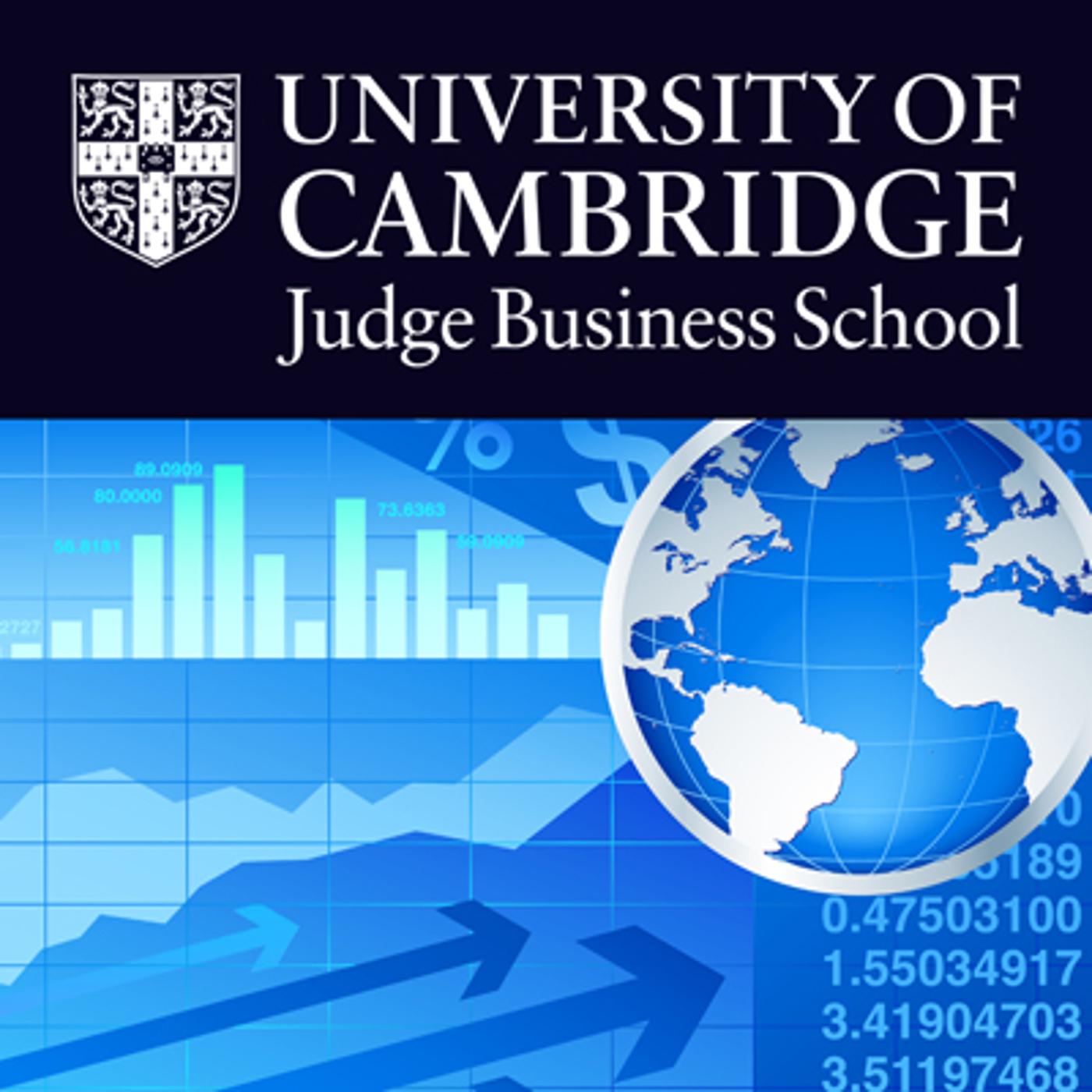Episodes
Is the globalisation which has shaped our world over recent decades slowing or even moving backwards in the wake of the Brexit vote in Britain and the election of Donald Trump as US president, asks the first podcast in the Cambridge Judge Business Debate series.
Published 02/06/18
Published 02/06/18
Students at business schools should think like biologists, according to acknowledged advertising authority Rory Sutherland of Ogilvy & Mather UK.
Conventional economic theory is extraordinarily narrow, blind to ethics, psychology, path-dependence and to marketing. Adopting aspects of evolutionary biology, psychology and behavioural science will create binocular vision and a different way of looking at problems.
Published 02/07/14
As pressure again mounts in the Eurozone leading Cambridge economist Michael Kitson says the euro might 'stagger on' for a few more years but eventually it will collapse. Policy makers have been papering over the cracks in the Eurozone and causing major problems for many member countries which are trapped by tight fiscal rules.
Published 07/05/13
As the European Parliament sets about reforming the EU Emission Trading System that is at the centre of Europe's climate policy, Dr David Reiner says it does work but has suffered in the recession and economic downturn.
Published 07/04/13
Alexander McLean, Founder and Director General of the UK-based charity The African Prisons Project (APP), talks about the work it is carrying out and the part played by Cambridge Judge Business School’s General Management Programme.
APP’s initial focus was to improve education and health in prisons by refurbishing libraries and medical facilities. Now, having worked with over 20,000 prisoners in Uganda, Kenya and Sierra Leone, attention is switching to leadership development for senior and...
Published 02/28/13
When austerity policies are linked positively to structured measures and discipline at a macro-economic level, the strategy works. However, just rapid and deep austerity cuts do not.
Dr Christos Pitelis warns that austerity measures on their own forces governments to simultaneously take steps to improve economic competitiveness, causing output to fall followed by a failure to revive economies. Austerity measures alone are widely seen as a bad move.
Published 01/04/13
Michael Kitson calls 2010-2020 a lost decade for the world economy. What is needed now, he argues, is a high level of aggregate demand and continued investment in new technology and innovation coupled with a major shift in economic thinking.
Published 08/23/12
Michael Kitson compares the current global recession to the Great Depression of the 1930s, and feels that austerity is here for a long time unless there is a change in economic policy globally as we well as in the UK.
Published 04/03/12
Dr Loretta Napoleoni discusses the themes from her latest book Maonomics - Why Chinese Communists Make Better Capitalists Than We Do. China, she says, has reaped the benefits of Western-invented globalisation and deregulation, yet its economic development offers lessons to the West as the West stumbles from crisis to crisis.
Published 03/22/12
As the government prepares to announce an overhaul of the UK's immigration policies, Michael Kitson says raising controls now may negatively affect the country's innovation and long-term future growth.
Published 02/07/12
Acclaimed economist and commentator Professor Paul Krugman expects the Greek government to default on its enormous debts and would not be surprised, in the aftermath, if the country withdraws from the Euro.
Published 07/07/11
Leading figures from the world of Islamic finance - Baljeet Kaur Grewal of KHR Research, Farmida Bi of Norton Rose and Richard Thomas of Gatehouse Bank - explored some of the contemporary issues with academic staff and other industry professionals.
Published 06/28/11
New research into relationships between the arts and humanities and the UK economy has revealed far greater interaction than expected
Published 06/09/11
Academics, investment professionals, philanthropists, directors of not-for-profit organisations and the charity sector are an under-serviced segment of the market which the School's unique week-long Endowment Asset Management programme will seek to attract as it expands its international direction.
Published 05/26/11
Dr Munir says that at a time when economists struggled to explain market behaviour, business schools should have grasped the chance to provide a new theoretical understanding of how markets work based on behavioural and historical evidence rather than untested assumptions.
Published 05/17/11
So what's fairer: an 'honest' vote for the party you support, a 'tactical' vote in a system you understand, or a vote cast under AV where a 'tactical' vote is harder to make? Dr Lionel Page's new research reveals that 'sophisticated' 'tactical' voting cost the Conservatives their UK General Election victory in 2010. So will AV be any fairer when tactical voting is more difficult?
Published 05/05/11
Japan's markets will continue to fluctuate until the nuclear crisis is resolved says Dr George Olcott
Published 03/22/11
A change of policy is needed to generate growth, monetarism won't work by itself argues Michael Kitson
Published 03/22/11
As world leaders pin their hopes on innovation to 'jump-start' their economies, there's a stark warning from Michael Kitson that it could take decades
Published 03/15/11
Why "tomorrow's regulators" involved in providing public goods will need more partnerships, less red tape, and more customer feedback through social media
Published 01/25/11
Academics from Cambridge Judge Business School have raised doubts about whether the size and speed of George Osborne's cuts will dampen the country's economic recovery and whether volunteers under the banner of working in a "Big Society" can really take on jobs previously performed by public sector workers. Boni Sones OBE reports.
Published 11/26/10
Ken Warwick believes the prospects are good as long as we rebalance the economy.
Published 08/13/10
It's a case of not "if" but "when". Crises and cycles, says Professor Lord Desai, are recurring events, every solution inevitably creates its own problems.
Published 08/13/10
Author, economist and political analyst Loretta Napoleoni has been tracing the intertwined roots of the world's monetary systems and the business of terrorism
Published 07/08/10


